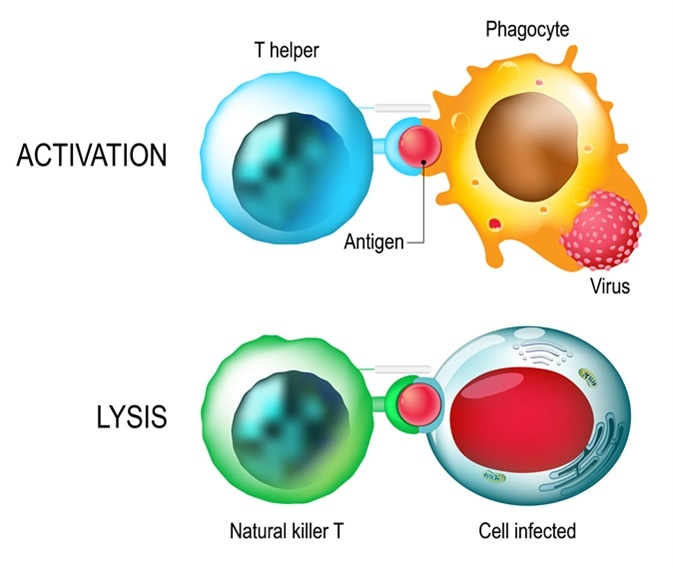Natural killer (NK) cells are a type of lymphoid cell that work in the innate immune system to remove infected or cancerous auto-cells.
The innate immune system
The innate immune system is the first line of defense against infection. It is non-specific and less effective than the acquired immune system, however it can respond to an immunological danger much more quickly and keep the danger off-track until a specific reaction can be mounted.
This immune system concerns the physical impediments of the skin and other epithelial surfaces, layers of mucus containing defensins, inflammation, the complementary system and various cells, including phagocytes, dendritic cells, mast cells and natural killer cells.

The role of natural killer cells in the innate immune system
Natural killer cells are initially developed in the primary lymphoid tissue of the bone marrow where they undergo positive and negative choices to remove self-targeting cells. Once they have matured, they move to secondary lymphoid tissues to undergo terminal maturation.
Mature NK cells have stimulatory receptors and inhibitors that regulate cell activity, for example killer cell immunoglobulin such as receptors (KIR) and NKG2D. More than 20 control receptors are known which function to identify proteins which are not usually present on the surface of a cell. The inhibitory receptors mainly identify proteins from the individual MHC I. This is because many types of viruses have evolved immunological escape strategies by downregulating the class of MHC I, meaning that the immune system cannot find their viral antigens.
Generally, if there is a remainder between inhibitor and the stimulatory signs then the inhibitory signs will exceed the signs of activation and the NK cell will not be activated, the meaning of the auto-cell will not be destroyed. However, if there is a lower inhibitory sign due to reduced MHC I on the cell surface or a high sign of activation due to increased production of tension ligands, then NK cell will be activated.
Once the NK cells are active they insert their lytic granules, which contain the cytotoxic chemical, into the infected cell. An immunological synapse is formed between the NK cells and the infected cell before the perforins and the Granzyme B are released. Perforins produce pores in the membrane that allow the death-inducing enzyme granzyme B to present the cell and induce assisted caspase apoptosis, resulting in cell death. Activated NK cells also produce cytokines (IFN- γ and TNF- α ) which recruit other members of the immune system and activate the acquired reaction.
Natural killer cell deficit
The importance of NK cells is explained in a deficit called natural killer cell with a rare state of immunodeficiency. People who suffer from this condition are highly susceptible to viral conditions as they lack NK cells, meaning the infected auto-cells cannot be found and destroyed. This condition occurs in two different types: classic NKD (CNKD) occurs when lymphocytes are not present in the peripheral blood, while functional NKD occurs when lymphocytes are present but do not function properly.
Natural killer cells and cancer treatment
Since NK cells target cancerous selector or infected viral cells due to their reduced MHC class I levels, scientists have proposed to arm their functioning to treat cancer cells. White blood cells are initially collected from the patient, activated and allowed to proliferate. They are then reintroduced into the body to target cancer cells.
Conclusion
Natural killer cells are essential for the functioning of the innate immune system, with absence having disastrous implications as explained by NKD. These cells also represent an exciting possible cancer treatment, which may just target cancer cells and could allow the immune system to destroy tumors with minimal side effects.
